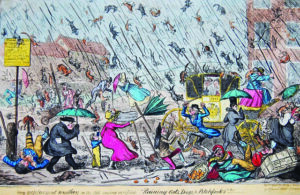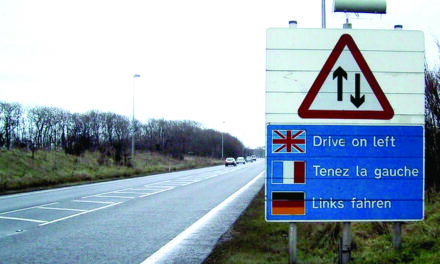English is one of the easiest languages to learn at a basic level, but one of the most difficult to become fluent in. While this is a gross generalization because it depends entirely on the linguistic origin of the person learning, it is, nonetheless, generally true. It shares many words with the Germanic and so-called Romance languages, like French, Italian and Spanish. The English vocabulary is 26 percent Germanic, 30 percent French and 30 percent Latin in origin. For those whose native language is Asian or Middle Eastern, however, with a completely different alphabet and approach to language, it is mind-blowing. The global availability of many sources of English, such as television, films, videos and the internet, makes learning bad English easy, but mangled English can still remain understandable—take American, for instance (sorry, couldn’t resist that). In more precise languages, like French and German, it is not so. I sometimes wonder if English isn’t the de facto language of diplomacy because of its inaccuracy; meanings can be subtly cloaked or subverted.
It’s easy to pick many instances where the English can be correct, but the meaning, to a learner, totally obscure and illogical if not actually the product of lunacy. For instance: a house that burns up burns down; you fill in a form by filling it out; an alarm goes off by going on. Sometimes, the meaning isn’t that of the words themselves: my bucket list; he kicked the bucket; she jumped down my throat; he hit the roof. Words like dough, tough, and bough are spelled similarly but pronounced differently. You can run something by someone, run up a bill or a hill. You can have a run in with someone, run into a shop, run into a friend, or get run over. There is no egg in eggplant, no ham in hamburger, and there is neither apple nor pine in pineapple. Sweetmeats are candies while sweetbreads are meat. Rocky Mountain oysters are not oysters. In short, English is a minefield for the learner aiming at anything higher than general usage and looking for some sensible rules to grasp without too many exceptions. People, not computers, invented English and it reflects the creativity of the human race. You could say it’s a race we are all in.
Even closely related English forms like British and American can have their pitfalls for the unwary visitor, and the more embarrassing have often been played up for comedic effect in films and videos. For instance, the image evoked by “firemen wearing red suspenders” is very different in the two countries, for suspenders in Britain are a garter belt. In Britain, a vest is an undershirt or waistcoat—depending on the context—a rubber is an eraser, knickers are feminine underwear not knee-length trousers, and pants are underwear too. Braces hold trousers up in Britain instead of a belt and so on, endlessly to be exploited by creative scriptwriters. Those firemen should be wearing red braces!
Both Britain and the U.S. also have regional dialects for the student of the language to cope with. It’s difficult enough for many Britons to understand someone with a broad Glasgow (Scottish) accent, let alone a foreigner (and, by the way, you should let foreigners alone). The northeast of England has its “Geordie” accent, with it’s own common usage and commonly substituted words like “yem” for “home.” For instance, “Away, man, gan yem canny” means “Goodbye, go home carefully.” Cockney, of course, is equally impenetrable. Perhaps the deep south of the U.S. and the New England states have similar difficulties.
Not only are the broader dialects impossible, but also the casually used, idiomatic phrases describing common conditions or situations would certainly mystify. Many of those are centuries old. For instance, “It’s raining cats and dogs;” we all know this is not to be taken literally and means it is raining very heavily. I’ve even heard “it’s raining stair rods.” You would have to know what stair rods are to understand that (straight rods over a stair carpet that are fastened each end in the angle between stairs to retain a carpet runner—which doesn’t run, by the way). Swedish actually has a parallel: “The rain stands like canes hitting the ground.” Forceful, heavy raindrops can look like an extended rod or cane.
The use of “cats and dogs” in the saying is equally inexplicable, though there are several possibilities. An equivalent phrase (with “polecats” instead of “cats”) was in use in the 17th century. There is also a Greek phrase: cata doxa, which means “contrary to experience or belief” that sounds like a logical origin, but no evidence exists that it is. One bizarre suggestion is that the poor drainage systems of the 17th century may have contained the corpses of dead animals which were expelled during a heavy rain or flood. A Jonathan Swift poem of 1710 actually refers to such.
Most languages have similar idioms about rain. For instance, the Afrikaans: “ou vrouens met knopkieries reën” literally means, “raining old women with clubs.” Strangely, Welsh has an equivalent: “raining old ladies and sticks.” Either to be avoided. An American response might be “Go figure!” or “Say, what?”, which itself might add to confusion. Many languages use idioms with the word “bucket” or some other container as the source of heavy rain, as in the British, “it’s bucketing down.” Certainly, I would hesitate to leave shelter in Norway when it’s “det regner trollkjerrier”—raining she-trolls.
People tell me two of the most difficult things to grasp in another language are jokes and puns. These often reference shared cultural experiences or allusions that a newcomer can have no inkling of. Whether raining cats, dogs, frogs, buckets or she-trolls, I’m sure all would totally confuse the student trying to learn the respective languages. I’m sure I wouldn’t stand a snowball’s chance in hell of learning Japanese or Arabic.
© David Cuin 2022




